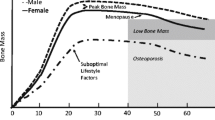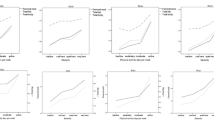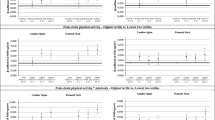Abstract
Exercise and improved nutrition offer safe, low-cost and widely applicable approaches to potentially reduce the burden of fractures. We conducted a cross-sectional study of 30 monozygotic and 26 dizygotic male twin pairs, aged 7–20 years to test the following hypotheses: (1) Associations between bone mass and dimensions and exercise are greater than between bone mass and dimensions and protein or calcium intakes; (2) exercise or nutrient intake are associated with appendicular bone mass before puberty and axial bone mass during and after puberty. Total body and posteroanterior (PA) lumbar spine bone mineral content (BMC) and mid-femoral shaft dimensions were measured using dual energy X-ray absorptometry (DEXA). Relationships between within-pair differences in nutrient intake (determined by weighed-food diaries) or exercise duration (determined by questionnaire) and within-pair differences in BMC and bone dimensions were tested using linear regression analysis. In multivariate analyses, within-pair differences in exercise duration were associated with within-pair differences in total body, leg and spine BMC, and cortical thickness. Every-hour-per-week difference in exercise was associated with a 31-g (1.2%) difference in total body BMC, a 10-g (1.4%) difference in leg BMC, a 0.5-g difference in spine BMC and a 0.1-mm difference in cortical thickness ( p <0.01- p <0.1). A 1-g difference in protein intake was associated with a 0.8-g (0.4%) difference in arm BMC ( p <0.05). These relationships were present in peri-pubertal and post-pubertal pairs but not in pre-pubertal pairs. Exercise during growth appears to have greater skeletal benefits than variations in protein or calcium intakes, with the site-specific effects evident in more mature twins.



Similar content being viewed by others
References
Kanis JA, Johnell O, Oden A et al (2000) Long-term risk of osteoporotic fracture in Malmo. Osteoporos Int 11:669–674
Stone KL, Seeley DG, Lui LY et al (2003) BMD at multiple sites and risk of fracture of multiple types: long-term results from the Study of Osteoporotic Fractures. J Bone Miner Res 18:1947–1954
Ray NF, Chan JK, Thamer M et al (1997) Medical expenditures for the treatment of osteoporotic fractures in the United States in 1995: report from the National Osteoporosis Foundation. J Bone Miner Res 12:24–35
Iuliano-Burns S, Saxon L, Naughton G et al (2003) Regional specificity of exercise and calcium during skeletal growth in girls: A randomised controlled trial. J Bone Miner Res 18:156–162
Bonjour JP, Carrie AL, Ferrari S et al (1997) Calcium-enriched foods and bone mass growth in prepubertal girls: a randomized, double-blind, placebo-controlled trial. J Clin Invest 99:1287–1294
Kanis JA (1999) The use of calcium in the management of osteoporosis. Bone 24:279–290
Karlsson M, Bass S, Seeman E (2001) The evidence that exercise during growth or adulthood reduces the risk of fragility fractures is weak. Best Pract Res Clin Rheumatol 15:429–450
Haapasalo H, Kontulainen S, Sievanen H et al (2000) Exercise-induced bone gain is due to enlargement in bone size without a change in volumetric bone density: a peripheral quantitative computed tomography study of the upper arms of male tennis players. Bone 27:351–357
Bass S, Pearce G, Bradney M et al (1998) Exercise before puberty may confer residual benefits in bone density in adulthood: studies in active prepubertal and retired female gymnasts. J Bone Miner Res 13:500–507
Bradney M, Pearce G, Naughton G et al (1998) Moderate exercise during growth in prepubertal boys: changes in bone mass, size, volumetric density, and bone strength: a controlled prospective study.[comment]. J Bone Miner Res 13:1814–1821
Ammann P, Bourrin S, Bonjour JP et al (2000) Protein undernutrition-induced bone loss is associated with decreased IGF-I levels and estrogen deficiency. J Bone Miner Res 15:683–690
Ammann P, Laib A, Bonjour JP et al (2002) Dietary essential amino acid supplements increase bone strength by influencing bone mass and bone microarchitecture in ovariectomized adult rats fed an isocaloric low-protein diet. J Bone Miner Res 17:1264–1272
Bourrin S, Toromanoff A, Ammann P et al (2000) Dietary protein deficiency induces osteoporosis in aged male rats. J Bone Miner Res 15:1555–1563
Gilsanz V, Roe TF, Antunes J et al (1991) Effect of dietary calcium on bone density in growing rabbits. Am J Physiol 260:E471–476
Schurch MA, Rizzoli R, Vadas L et al (1996) Protein supplements in elderly with a recent hip fracture increase serum IGF-1, decrease urinary deoxypyridinoline, and prevent proximal femur bone loss. J Bone Miner Res 11:S139
Matkovic V, Kostial K, Simonovic I et al (1979) Bone status and fracture rates in two regions of Yugoslavia. Am J Clin Nutr 32:540–549
Heaney RP (2002) The importance of calcium intake for lifelong skeletal health. Calcif Tissue Int 70:70–73
Bonjour JP, Schurch MA, Chevalley T et al (1997) Protein intake, IGF-1 and osteoporosis. Osteoporos Int 7 [Suppl 3]:S36–42
Adams P, Berridge FR (1969) Effects of kwashiorkor on cortical and trabecular bone. Arch Dis Child 44:705–709
Rizzoli R, Ammann P, Chevalley T et al (1999) Protein intake during childhood and adolescence and attainment of peak bone mass. In: Bonjour JP, Tsang RC (eds) Nutrition and bone development. Lippincott-Raven, Philadelphia, pp 231–243
Karlsson MK, Weigall SJ, Duan Y et al (2000) Bone size and volumetric density in women with anorexia nervosa receiving estrogen replacement therapy and in women recovered from anorexia nervosa. J Clin Endocrinol Metab 85:3177–3182
Slemenda CW, Miller JZ, Hui SL et al (1991) Role of physical activity in the development of skeletal mass in children. J Bone Miner Res 6:1227–1233
Willett W (1990) Nutritional epidemiology. Oxford University Press, New York
Jenner DA, Neylon K, Croft S et al (1989) A comparison of methods of dietary assessment in Australian children aged 11–12 years. Eur J Clin Nutr 43:663–673
Young D, Hopper JL, Macinnis RJ et al (2001) Changes in body composition as determinants of longitudinal changes in bone mineral measures in 8- to 26-year-old female twins. Osteoporos Int 12:506–515
Aron A, Aron EN (1994) Statistics for psychology. Prentice-Hall, Englewood Cliffs, NJ, USA
Morris FL, Naughton GA, Gibbs JL et al (1997) Prospective 10-month exercise intervention in premenarcheal girls: positive effects on bone and lean mass. J Bone Miner Res 12:1453–1462
Lee WT, Leung SS, Leung DM et al (1995) A randomized double-blind controlled calcium-supplementation trial, and bone and height acquisition in children. Brit J Nutr 74:125–139
Lee WT, Leung SS, Wang SH et al (1994) Double-blind, controlled calcium supplementation and bone mineral accretion in children accustomed to a low-calcium diet. Am J Clin Nutr 60:744–750
Johnston CC Jr, Miller JZ, Slemenda CW et al (1992) Calcium supplementation and increases in bone mineral density in children. N Engl J Med 327:82–87
Scerpella TA, Davenport M, Morganti CM et al (2003) Dose-related association of impact activity and bone mineral density in pre-pubertal girls. Calcif Tissue Int 72:24–31
Seeman E (2002) An exercise in geometry. J Bone Miner Res 17:373–380
Bass SL, Saxon L, Daly RM et al (2002) The effect of mechanical loading on the size and shape of bone in pre-, peri-, and postpubertal girls: a study in tennis players. J Bone Miner Res 17:2274–2280
Seeman E (2002) Pathogenesis of bone fragility in women and men. Lancet 359:1841–1850
Seeman E (2003) Periosteal bone formation—a neglected determinant of bone strength. N Engl J Med 349:320–323
Jones HH, Priest JD, Hayes WC et al (1977) Humeral hypertrophy in response to exercise. J Bone Joint Surg Am 59:204–208
Bass S, Delmas PD, Pearce G et al (1999) The differing tempo of growth in bone size, mass, and density in girls is region-specific. J Clin Invest 104:795–804
Munger RG, Cerhan JR, Chiu BC (1999) Prospective study of dietary protein intake and risk of hip fracture in postmenopausal women. Am J Clin Nutr 69:147–152
Feskanich D, Willett WC, Stampfer MJ et al (1996) Protein consumption and bone fractures in women. Am J Epidemiol 143:472–479
Sellmeyer DE, Stone KL, Sebastian A et al (2001) A high ratio of dietary animal to vegetable protein increases the rate of bone loss and the risk of fracture in postmenopausal women. Study of Osteoporotic Fractures Research Group. Am J Clin Nutr 73:118–22
Hannan MT, Tucker KL, Dawson-Hughes B et al (2000) Effect of dietary protein on bone loss in elderly men and women: the Framingham Osteoporosis Study. J Bone Miner Res 15:2504–2512
Ruiz JC, Mandel C, Garabedian M (1995) Influence of spontaneous calcium intake and physical exercise on the vertebral and femoral bone mineral density of children and adolescents. J Bone Miner Res 10:675–682
Kardinaal AF, Ando S, Charles P et al (1999) Dietary calcium and bone density in adolescent girls and young women in Europe. J Bone Miner Res 14:583–592
Boot AM, de Ridder MA, Pols HA et al (1997) Bone mineral density in children and adolescents: relation to puberty, calcium intake, and physical activity. J Clin Endocrinol Metab 82:57–62
Dibba B, Prentice A, Ceesay M et al (2000) Effect of calcium supplementation on bone mineral accretion in Gambian children accustomed to a low-calcium diet. Am J Clin Nutr 71:544–549
Author information
Authors and Affiliations
Corresponding author
Rights and permissions
About this article
Cite this article
Iuliano-Burns, S., Stone, J., Hopper, J.L. et al. Diet and exercise during growth have site-specific skeletal effects: a co-twin control study. Osteoporos Int 16, 1225–1232 (2005). https://doi.org/10.1007/s00198-004-1830-z
Received:
Accepted:
Published:
Issue Date:
DOI: https://doi.org/10.1007/s00198-004-1830-z




